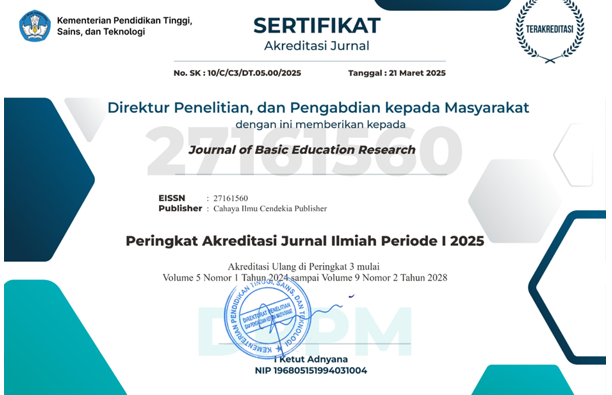Pengaruh Penggunaan Metode Drill Terhadap Kemampuan Menggali Informasi dari Dongeng Peserta Didik Kelas II Sekolah Dasar
Abstract
Penelitian ini bertujuan untuk mengetahui pengaruh penggunaan metode drill terhadap kemampuan menggali informasi dari dongeng (fabel) tentang sikap hidup rukun dari teks lisan dan tulis peserta didik kelas II Sekolah Dasar Negeri 13/1 Muara Bulian. Penelitian ini menggunakan pendekatan kuantitatif yang berbentuk quasi eksperimen. Subjek penelitian ini kelas IIC yang terdiri dari 23 siswa sebagai kelas kontrol dan IID yang terdiri dari 25 siswa sebagai kelas eksperimen. Hasil penelitian menunjukan bahwa nilai rata-rata kelas eksperimen yaitu 88,2. Sedangkan nilai rata-rata kelas kontrol yaitu 62,86. Berdasarkan hasil uji hipotesis nilai post-test didapatkan thitung > ttabel (0,1362<2,01290) yang dibuktikan dengan taraf signifikan α = 0,05 dan dk= 46 ini berarti hipotesis Ha diterima dan Ho ditolak, dengan demikian dapat disimpulkan bahwa penggunaan metode drill berpengaruh terhadap kemampuan menggali informasi dari dongeng peserta didik di kelas II Sekolah Dasar.
References
P. Anjayani, and S. Suprapto. “Error analysis on the use of prepositions in students’ writing (a case study of the eleventh grade students of SMA negeri 9 semarang in the academic year of 2014/2015),” ELT Forum: Journal of English Language Teaching, vol. 5 no. 2), 2016.
E. Suriyanti. “Hubungan Minat Baca dan Penguasaan Kosakata dengan Pemahaman Membaca Siswa Kelas VII SMP Islam Banda Aceh,” Master Bahasa, vol. 5 no. 2, pp.128-136, 2017.
D. Patiung. “Membaca Sebagai Sumber Pengembangan Intelektual,” Al Daulah: Jurnal Hukum Pidana dan Ketatanegaraan, vol. 5 no. 2, pp. 352-376, 2016.
Permendikbud. “Peraturan Menteri Pendidikan dan Kebudayaan Nomor 24 Tahun 2016 Tentang Kompetensi Inti Dan Kompetensi Dasar Pelajaran Pada Pendidikan Dasar Dan Menengah,” 2016.
L. R. Wachidah, H. Suwignyo, and N. Widiati. “Potensi Karakter Tokoh dalam Cerita Rakyat sebagai Bahan Bacaan Literasi Moral,” Jurnal Pendidikan: Teori, Penelitian, dan Pengembangan, vol. 2 no. 7, pp. 894-901, 2017.
Y. Kiliç. “Survey on effects of fairy tales on Turkish language training from secondary school students perspective,” Educational Research and Reviews, vol. 10 no. 4, pp. 388-396, 2015.
Y. Abidin. “Pembelajaran Bahasa Berbasis Pendidikan Karakter,” PT Refika Aditama, 2015.
N. Wahyuni. “Penggunaan Metode Drill Dalam Pembelajaran Matematika,” Online, vol. 2 no. 1, pp. 399-896, 2013.
Sugiyono. “Metode Penelitian Pendidikan (Pendekatan Kuantitatif, Kulitatif, dan R&D),” Alfabeta, 2016.
K. Uno. “Assessment Pembelajaran,” PT Bumi Aksara, 2013.
A. Astalini, D. Darmaji, D. A. Kurniawan, and A. Destianti. “Description of the Dimensions Attitudes towards Science in Junior High School at Muaro Jambi,” IJSBAR, vol. 47 no. 1, pp. 1-11, 2019.
Syahrial, Asrial, D. A. Kurniawan, R. A. Pratama, and R. Perdana. “Towards Improving The Critical Thinking Skills of Pre-service Teachers in Indonesia,” Journal of Education and Learning (EduLearn), vol. 13 no. 4, pp. 575-582, 2018.
Astalini, Darmaji, L. R. Sholihah, and R. Perdana. “Characteristics of Students Attitude to Physics in Muaro Jambi High School,” Humanities and Social Sciences Reviews (HSSR), vol. 7 no. 2, pp. 91-99, 2019.
D. Darmaji, D. A. Kurniawan, A. Astalini, A. Lumbantoruan, and S. C. Samosir. “ Mobile Learning in Higher Education for The Industrial Revolution 4.0: Perception and Response of Physics Practicum,” International Journal of Interactive Mobile Technologies (iJIM), vol. 13 no. 9, pp. 4-20, 2019.
Astalini, Darmaji, H. Pathoni, W. Kurniawan, Jufrida, D. A. Kurniawan, and R. Perdana. “Motivation and Attitude of Students on Physics Subject in the Middle School in Indonesia,” International Education Studies (IES) Journal, vol. 12 no. 9, pp. 15-26, 2019.
D. Darmaji, A. Astalini, D. A. Kurniawan, and R. Perdana. “A Study Relationship Attitude Toward Physics, Motivation, and Character Discipline Students Senior High School in Indonesia,” International Journal of Learning and Teaching, vol. 11 no. 3, pp. 99-109, 2019.
D. A. Kurniawan, Darmaji, Astalini, and P. Sefiah. “Description of Science Process Skills for Physics Teacher’s Candidate,” Azerbaijan Journal of Educational Studies, vol. 684 no. 3, pp. 71-85, 2018.
Asrial, et al. “Identification: The Effect of Mathematical Competence on Pedagogic Competency of Prospective Teacher,” Humanities and Social Sciences Reviews (HSSR), vol. 7 no. 4, pp. 85-92, 2019.
Astalini, D. A. Kurniawan, Darmaji, A. D. Putri, and R. Nawangsih. “Identify Student’s Attitude Towards the Subject of Natural Science,” Journal of Education and Learning (EduLearn), vol. 13 no. 3, pp. 386-394, 2019.
Syahrial, et al. “Increased Behavior of Students’ Attitudes to Cultural Values Using the Inquiry Learning Model Assisted by Ethnocontructivism,” Journal of Educational Science and Technology, vol. 5 no. 2, pp. 176-188, 2019.
Maison, Darmaji, Astalini, D. A. Kurniawan, and P. S. Indrawati. “Science Process Skills and Motivation,” Humanities and Social Sciences Reviews (HSSR), vol. 7 no. 5, pp. 48-56, 2019.
Asrial, Syahrial, D. A. Kurniawan, N. Amalina, and M. Subandiyo. “Description of Elementary Teacher Education Program’s Student: Mapping Indonesian Language Competence for Prospective Teacher,” The Educational Reviews, vol. 3 no. 2, pp. 21-27, 2019.
D. A. Kurniawan, Astalini, Darmaji, and R. Melsayanti. “Students’ Attitude Towards Natural Sciences,” International Journal of Evaluation and Research in Education (IJERE), vol. 8 no. 3, pp. 463-468, 2019.
Syahrial, Asrial, D. A. Kurniawan, and S. O. Piyana. “E-Modul Etnokontruktivisme: Implementasi pada Kelas V Sekolah Dasar Ditinjau Dari Persepsi, Minat dan Motivasi,” Jurnal Teknologi Pendidikan, vol. 21 no. 2, pp. 165-177, 2019.
Jufrida, W. Kurniawan, Astalini, Darmaji, D. A. Kurniawan, and W. A. Maya. “Students’ Attitude and Motivation in Mathematical Physics,” International Journal of Evaluation and Research in Education (IJERE), vol. 8 no. 3, pp. 401-408, 2019.
Copyright (c) 2020 Septia Wulandari

This work is licensed under a Creative Commons Attribution-NonCommercial 4.0 International License.
Authors who publish with this journal agree to the following terms:
- Authors retain copyright and acknowledge that the Journal of Basic Education Research is the first publisher licensed under a Creative Commons Attribution 4.0 International License.
- Authors are able to enter into separate, additional contractual arrangements for the non-exclusive distribution of the journal's published version of the work (e.g., post it to an institutional repository or publish it in a book), with an acknowledgment of its initial publication in this journal.
- Authors are permitted and encouraged to post their work online (e.g., in institutional repositories or on their website) prior to and during the submission process, as it can lead to productive exchanges and earlier and greater citation of published work.





.png)


.png)
.png)


















